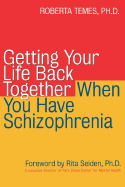
Discussion on the needs of children who have parents with a mental illness. What is that like and what can be done to help children, even adult children, who have a parent with a mental illness?
Tina Kotulski, author of the Schizophrenia book: Saving Millie; A Daughter's Story of Surviving her Mother's Schizophrenia is our guest. She says children of parents with psychiatric disabilities are all too often ignored in every area of health care.
is our guest. She says children of parents with psychiatric disabilities are all too often ignored in every area of health care.
Natalie: is the HealthyPlace.com moderator
The people in blue are audience members
Natalie: Good evening. I'm Natalie, your moderator for tonight's Schizophrenia chat conference. I want to welcome everyone to the HealthyPlace.com website.
Tonight's conference topic is "Surviving A Family Member's Mental Illness." Our guest is Tina Kotulski. Tina's mother has schizophrenia. She went undiagnosed for 20-years; which made for a very difficult life for Tina.
Good Evening, Tina, and thank you for joining us tonight.
Tina Kotulski: Thank you for having me.
Natalie: Tonight, we're addressing the needs of children who have parents with a mental illness. We're going to discuss what that's like and what can be done to help children, and even adult children, who have a parent with a mental illness.
Your mother has schizophrenia. She went undiagnosed for 20 years. You say: "Mental illness, like any affliction, is a burden not only to those with a diagnosis, but family, friends, daughters and sons, husbands and wives, and medical professionals." I'd like you to elaborate on that.
Tina Kotulski: Being diagnosed with a mental illness is just the beginning. Regardless of how long a family member has been displaying symptoms, finding the appropriate treatments and physicians that are knowledgeable on drug interactions is a real struggle. As a family member, we know our mentally ill family member's baseline status. We know when things are starting to not go right for them. Yet, when we try to intervene and try to communicate that, to either the mentally ill relative, or to a mental health professional, we are not listened to until there is a crisis. Our system is set up to deal with a crisis, not preventative measures that save money, hardship, lives and time for all involved. That includes the mental health system, itself, that spends more money on crisis. Therefore, mental illness is a burden to all of society, not just the person who is diagnosed with the illness.
Natalie: Your mother has paranoid schizophrenia -- probably one of the most serious of all psychiatric disorders. How old were you when you began to realize something was wrong with your mother and what year was this?
Tina Kotulski: A person learns what they live and it was not until I was removed from my mother's care when I was thirteen, that I really understood that my mother was not well. Living with my mother when my sister and I were younger, I was left to straddle two worlds. One world was surviving in my mother's world; psychosis, paranoia and, at times, sweet and compassionate. The other was my sister's world. She preferred to avoid my mother, whereas I tried to control my environment, so I could get my needs met.
It was not until I went through my own therapy, after being removed from my mother's care, that I learned that straddling both of these worlds in order to survive was harmful to my very existence. There had been no consistency, structure or nurturing. That always quickly changed with my mother's moods. My identity was based on my successes and failures at trying to care for my mother and keeping her in a mindset that was healthy and nurturing for me and my sister. Essentially, I was the caregiver.
Natalie: What was life like for you during this time? Your relationship with your parents, sister? Did you have friends? How were things going for you in school? Do you remember how you felt about yourself; your self-image?
Tina Kotulski: Lonely, isolated, sad.
Natalie: That is a very tough existence! especially for a child....a teenager. Was your father was home at that time? If so, did he try and help?
Tina Kotulski: My father moved out when I was six months old. Occasionally I went to visit, often at Christmas time and once during the summer. But their environment was restrictive and unfriendly in its own way. My sister preferred to visit my father more often, but I was confused by their relationship. My father witnessed abuse and walked away from it to save himself, yet he left my sister and me in that environment he escaped from. I felt uncomfortable to be around someone who didn't try to, or at least, didn't appear to want to be around me except for brief visits once or twice a year. I felt out of place, as if I was a trouble or bother to him.
Natalie: Your father left home. Do you know what motivated him to do that - knowing full well that your mother was not fit to raise children alone?
Tina Kotulski: In an interview, my father said very clearly that he left to save himself. He started a new family and from my take on things, how I saw it and understand it according to his interview and what I witnessed growing up, is that he was truly ashamed that he ever was involved with a woman that was mentally unstable. He didn't count on having to deal with the added stress of having to care for a mentally ill woman, on top of a new daughter and unfinished dreams. My father's interview, that was heavily edited for the film, Out of the Shadow, is much more brazen than what I have expressed.
Natalie: Then, at age 12, your sister left to live with your father's new family. So you're home alone with your mother. You were physically and emotionally abused by her. So that our audience members have an understanding of what that part of your life was like, can you please provide us with a few details?
Tina Kotulski: Life with my mother, Millie, wasn't always bad. There were times when I enjoyed being with her and my sister. However, times like that were hard because I always knew they would end and most times they would end abruptly. But I still relished those times and held on to the notion that my mother would someday be the mother that I always dreamt of. When my sister left, however, Millie became more withdrawn and her paranoia became very frightening for me. So I spent more time away by simply riding my bike around town and getting into trouble. I describe those lonely days in my book.
Natalie: I want to flash forward to today. As an adult looking back on that period, do you wish you would have left home as your sister did?
Tina Kotulski: I don't have an answer that would satisfy even myself. Because my father was deeply ashamed of his past relationship with my mother, I felt as if he were ashamed of me as well. What he said about my mother, to me, growing up when I visited him made me feel as if I was entering a world that was less friendly than what I lived in with Millie. I was put in the middle of how he felt about my mother and wanting deeply to be accepted and loved unconditionally. I felt as if I had to choose sides when I visited him and it became worse when I had to live with him. I didn't want to abandon my mother to win my father's approval.
Natalie: How did living through this period of time as a child impact you as an adult?
Tina Kotulski: It's made me an advocate not only for myself, my family and others who grow up in the shadow of mental illness but it has made me believe that good things can come from bad experiences. I don't let my past dictate my future, but I do allow my past experiences to guide me in the mission of Extraordinary Voices Press. Children of parents with psychiatric disabilities are all too often ignored in every area of health care. Extraordinary Voices Press is working on changing that so policies can be enacted to protect the children and family.
Natalie: You have been married for 19 years. You have 3 children. I know that you are very involved with consumer mental health groups. In another interview you did, you said "The psychologists and psychiatrists that treat children who have been severely physically and mentally abused often put studies out saying that many of us would be incapable of having children and not repeating that abuse and having a successful relationship with a spouse. It was my dream to dispel that myth." Do you think it's a myth in general or for you specifically?
Tina Kotulski: I believe it is a myth that undermines the ability of persons to overcome situations when the odds are not in their favor. When a medical professional sees a parent with diabetes in the office, that medical professional will most likely go over nutrition and the genetic factors that their children are predisposed to and counsel the parent on ways to avoid diabetes in their children. Proper nutrition, adequate exercise, etc.
When a parent with a mental illness comes into the mental health office or even a medical office, what counseling is given to the extended family members about prevention? None! Instead, behaviors that undermine our ability to overcome our predetermined genetic disposition are not even mentioned. We are handed more prescriptions and complementary family involvement is never even considered. Instead, crisis management is what comes into play. And when the system looks at crisis management and the treatment of a disease instead of prevention, then families will always lose, especially the children. I'd like to see every diabetic patient ignored until his or her sugar levels are in the 800 range. Or how about every patient with heart disease ignored until they are in cardiac arrest.
When people have a medical diagnosis, there is at least some prevention. Not much, but at least it's not considered impossible, nor is it considered malpractice. If you counsel your patients on proper nutrition and exercise and you have a medical diagnosis, then it is considered a part of their treatment plan. When a person with a mental illness is diagnosed, nutrition and exercise are never even considered to be a part of the treatment plan. Why not? And what about when there is a crisis? What preventative measures are put into place when a parent needs to be hospitalized? It's the child that gets shuffled around.
Natalie: A lot of your story took place over 25 years ago. Mental illness was even more stigmatized than it is today and let me preface that by saying there's still a lot of stigma and shame attached to mental illness even today. Was there a lot of denial in your family about what was going on with your mom?
Tina Kotulski: Yes.
Natalie: Were you ashamed of her and your situation? How did you handle that?
Tina Kotulski: I wasn't ashamed of my mother. I was ashamed of who I was at that time in my life. My very self-esteem was built on caring for my mother. If my mother was happy, then I felt good about myself. If my mother was not doing well, then I thought I was to blame for my mother's condition. So to survive in that type of situation, my needs came last. I did what I had to do to survive and I suppressed my needs for love and nurturing by doing what I could to stay alive. My basic needs came first and I was overjoyed and took in like a sponge when I was given warmth and tenderness; love.
Natalie: I think that's a very important point you make and hopefully parents in the audience tonight will remember that children feel a very heavy burden and responsibility for trying to "make their parents happy." As you said, your very happiness was tied into that.
What was your mom's experience with the mental health system? Was she getting the treatment she needed? Did it improve over the years? How is she today?
Tina Kotulski: My mother didn't get involved with the mental health system until I had moved out. No, she wasn't getting the treatment she needed because it was so inconsistent from county-to-county. Today is a different story. She is involved with the mental health system, but on a very limited basis. And for now, she is doing very well.
Natalie: How do you view your mother today?
Tina Kotulski: She's a wonderful grandparent. She's self-sufficient provided she is in an environment that she can thrive in. She can't live on her own, but she has her own space in our home. We take one day at a time.
Natalie: There are a lot of people in the audience tonight who face similar situations in dealing with a family member who has a mental illness. What suggestions do you have regarding caring for a family member? And what about taking care of yourself?
Tina Kotulski: Always care for yourself first. Stress can lead to poor health. So take time for yourself and try to enjoy the small things.
Natalie: And finally, your suggestions when there's a child in the home? Are there any special considerations that need to be taken into account?
Tina Kotulski: Keep all medications out of children's reach. And remember that children sometimes are placed in vulnerable situations as a result of a parent's mental illness. Therefore, looking after the needs of children is incredibly important, even outside of the parent who has a mental illness.
Natalie: Tina, here's the first audience question:
akamkin: I am a young woman who was diagnosed with bipolar at the age of 24. I have always struggled with the idea of having children and passing my bad genes along. If you had bipolar yourself would you have your own children after what you went through?
Tina Kotulski: I believe I would be selling myself short if I gave into the notion that I would pass the illness onto my children. Having diabetes, heart disease or other medical conditions don't stop others from having children. Having a child, no matter what your condition, is the best part of you. Only you can take that away from yourself.
Robin45: Do you think this book would be good for a parent caring for an adult child with schizoaffective disorder, in other words, visa verse?
Tina Kotulski: Absolutely. Saving Millie is about making changes within our system. I use my story to launch changes we all need to see...and are ready to see occur.
ladydairhean: I believe that my mother has severe schizophrenia. The problem I have is that I can't tell how much of her behavior is caused by the illness and how much of it is an act for attention because she's smart enough to know what she's doing.
Tina Kotulski: One of my mother's abilities as a young mother (I know better now) was that she could be very manipulative. She would play the battered woman. "Whoa is me." As a child, I fell into that trap and it backfired for me. Now as an adult, I have boundaries that she must abide by in order to remain in our home. I will not let her talk that way in front of me or my children. You have to make boundaries for yourself.
kitkat: You mentioned that children's needs are often ignored. This effects self-esteem sometimes into adulthood. What precautions do you or other people who interact with these children or adult children need to take when they open up about their lives?
Tina Kotulski: I am not a mental health provider. What I am is an adult child with a parent who has a mental illness. And when I train mental health providers or go on speaking engagements, I always say "let us have our feelings validated." We are entitled to feel every emotion you can think of. Not only do many of us not realize we lost our childhood until we are adults, but we lack the trust essential to believe we are special to other people. Our common experiences make us special. We need our own voice. That is why I started Extraordinary Voices Press.
lindabe: Have you had the experience of therapists telling you that you are codependent because you are so involved in your mother's survival? If so, how do you feel about that? I have had that experience and I didn't feel that the therapist knew what it's like.
Tina Kotulski: Yes, I have had mental health professionals tell me that and act as if I know not what is in my mother's best interest. In fact, recently that happened. I said my mother has high liver enzymes. I was told, no, she has the flu. Sure enough, my mother's liver enzymes were in the 800 range. That is toxic. She is better now.
dwm: Having grown up with a mother who had an undiagnosed mental illness, I wholeheartedly enjoyed your book, Tina. My mother now has a diagnosis but is still not receiving treatment (frankly, I think she never will). For those of us who are caring for a mentally ill parent and cannot, for whatever reason, go the route of the mental healthcare system, have you personally found any help for your mother using alternative methods (alternative/complementary health)? If so, what have you found the most effective route?
Tina Kotulski: Because my mother lives with me, I can monitor the amount of sugar she consumes. She loves sugar and it leads to health problems which lead to more medications. Also, she is on a treatment plan that Dr. Abram Hoffer wrote about in his many books, one in particular, Healing Schizophrenia by natural nutrition. He has years of research to back his treatment. I suggest you read some of his work. It's phenomenal. Also, my mother is on a low dose of an antipsychotic, but nothing like she was before she moved in with us two years ago.
Natalie: Our time is up tonight. Thank you, Tina, for being our guest, for sharing your personal story, providing some excellent information and for answering audience questions. We appreciate you being here.
Tina Kotulski: Thank you all for listening and asking such wonderful questions.
Natalie: Thank you, everybody, for coming. I hope you found the chat interesting and helpful.
Good night everyone.
Disclaimer: We are not recommending or endorsing any of the suggestions of our guest. In fact, we strongly encourage you to talk over any therapies, remedies or suggestions with your doctor BEFORE you implement them or make any changes in your treatment.


















